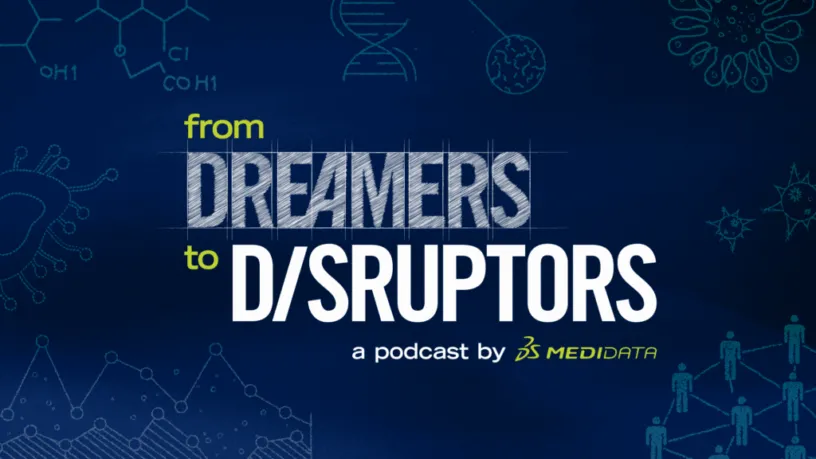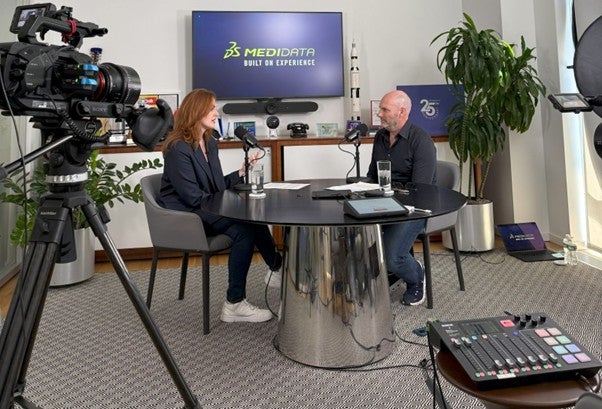from Dreamers to Disruptors: Exploring Digital Therapeutics and Inequalities in Women’s Healthcare with Jessica Federer

Welcome to the Clinical Minds “Innovator Insights Corner,” where we’ll be sharing fascinating stories, perspectives, and predictions from the guests of ‘from Dreamers to Disruptors’, a podcast by Medidata exploring life sciences innovation and the visionaries behind it all.
Inaugural guest Jessica Federer is a true pioneer in clinical research and a passionate advocate shedding light on the inequalities in women’s healthcare. Through a career that included serving as Bayer’s first Chief Digital Officer, she has championed breakthroughs in clinical trial technologies—and is an expert in navigating the roadblocks that often stop the adoption of ground-breaking solutions that have the potential to shake up entire industries.

The Rise of Digital Therapeutics
Digital therapeutics (DTx) is an emergent and crucial focus for the life sciences industry. This form of precision medicine uses evidence-based, software-driven tools that are approved by regulators. They can deliver personalized care to patients that’s tailored to their specific needs and preferences. For example, a digital therapeutic could take the form of a mobile app that helps treat major depressive disorder symptoms.
“I think it's a no-brainer that at some point soon, most new drugs coming to market will have a digital component to them, that we will have a much higher adoption of digital therapeutics, because it delivers on the promise of precision medicine…”
- Jessica Federer
Every single one of us is unique, and as technologies advance, it becomes increasingly possible for new treatments to essentially customize around specific traits, medical histories, and more. “[Digital Therapeutics] delivers on the ability to be adaptable, whether you're 6'6" or 4'10". It delivers on the promise of being responsive, passive, and part of your life in a way that makes so much sense, when you're looking at improving health outcomes, that it's inevitable,” says Jessica.
DTx represent an exciting evolution in the patient experience that leverages the bold strides we’ve made in healthcare and beyond. They can be used as a standalone treatment, or combined with drugs and other traditional therapies. The possibilities seem near-endless; Medidata’s recent partnership with Click Therapeutics is a pivotal step forward, setting a gold standard in patient-centric care and enabling customers and partners to significantly enhance therapeutic benefit through digital companions for their drug labels.
“What we think is different about Click is that they actually have run the Phase II and III clinical trials to show the empirical evidence for the drug in combination,” says Anthony. “They call it software-enhanced drugs, or SE drugs. The drug with an SE app that goes along with it, according to [the] FDA and the outcomes of the research, actually shows a clinical benefit above and beyond the drug alone.”
“I think this next era is one of digital therapeutics. They're actually in the label, and that they are seen as prescribed hand-in-glove with a drug or a medical device to enhance the patient outcomes beyond what the drug was going to do alone.”
- Anthony Costello
From Impossible to Boring: Scaling Innovation
Innovation doesn’t happen in a day. It’s the product of sleepless nights, seemingly infinite review and iteration cycles, testing, re-testing, and an unending supply of patience. But the invention and development of exciting new tools is just the beginning; the real hurdle is in adoption and scalability.
So much needs to happen from creation to integration. And it’s within that space that dreams either take flight, or falter.
“...that's the secret of disruption. But in between the dream and the successful disruption is an incredibly frustrating amount of process. And that's the magic of getting anything done at scale, it has to go from exciting to boring.”
- Jessica Federer
It’s not unusual for these shiny new ‘things’ to emerge from start-ups and smaller organizations, but they sometimes lack the resources and staying power to gain necessary regulatory approvals, work out the kinks, and ultimately achieve industry-wide implementation. This is why it’s so important for larger, established organizations to adopt promising new technologies and make them disruptive. Fresh perspectives are invaluable, but deep expertise is often needed to maximize potential.
“When something gets to be holistic and disruptive… and easy enough to adopt that it fits into something like a CEO's set of goals, it's been through a lot of walls to get there. It's broken through.”
- Anthony Costello
The Fight Against Women’s Healthcare Inequalities
Jessica is a longstanding champion for women’s healthcare, and an advocate for increased investment to help close the research and data gaps that continue to affect our understanding of how sex-based differences alter diagnoses and health outcomes.
It wasn’t until 1993 that US law required women to be included in clinical trials. “That's the year the movie Jurassic Park came out, the original, also the year Groundhog Day came out,” says Jessica. “For many of us, that is very recent history, and that was just the first-time women were required to be in federally funded studies. So we're playing a lot of catch-up when it comes to understanding sex-based differences in our industry.”
These research and data gaps can limit our understanding of serious conditions in a profound way. “We're at a place now where 80% of autoimmune disease is in female patients,” Jessica continues. “Two-thirds of Alzheimer's patients are women, and women are still 50% more likely to die in the year after a heart attack than men.”
While we strive to ensure better representation across trials, technological advances and more sophisticated approaches to data management and manipulation—such as the tools in Medidata’s unified Data Experience—are helping to fill the gaps.
“From a data perspective, you know that we're missing some data, but thanks to technology, now we can use the data that exists,” says Jessica. “We can jump ahead, using technology to make up for the data gaps. I actually think the most exciting space in science today is women's health, and the reason is just because of what we don't know.”
Takes One to Know One
There is no progress without patients. Understanding their perspectives and lived experiences is crucial to the effectiveness of a patient-centric approach in clinical research, but we can take it one step further by putting ourselves directly in their shoes.
“If you're going to work in this industry, you need to participate in a clinical trial. It's just doing your homework; it's getting the experience of the person that matters most.”
- Jessica Federer
It’s a powerful statement that rings true, especially in an industry that relies on the willingness and trust of individuals to put their bodies on the line to advance medical progress. If you’re feeling inspired and are located in the United States, visit JoinAllOfUs.org to learn more about the ongoing NIH study open to all.
Listen to Jessica and Anthony’s full conversation in from Dreamers to Disruptors Episode 1 to discover more about digital therapeutics, women’s healthcare inequalities, the challenges of adopting new pharma technologies, and more.
Contact Us
